Personalized Search: How to Optimize Your Site for Conversions
Updated on 29 Nov 2024
Let’s say you visit an online apparel store regularly.
During your last visit, you spent a lot of time looking at a pair of sleek black boots yet didn’t make a purchase. This time, you search for “shoes,” and right at the top are those same boots—like the store remembered what you were considering.
That’s what personalized search does.
It doesn’t just list results; it remembers your preferences and suggests exactly what you’re looking for. This is a big deal because nearly half of all ecommerce visitors use the search bar to find products.
Now, imagine turning every search into a highly personalized shopping experience.
In this guide, we’ll explore what personalized search is, why it’s essential, and how to implement it to facilitate seamless product discovery and increase your sales.
Let’s get started.
What is personalized search?
Personalized search in ecommerce is an advanced feature that tailors search results to each shopper’s unique preferences, behaviors, and context. It goes beyond simple keyword matching to deliver results that feel relevant and specific to the individual user.

Unlike traditional search, which shows the same results to everyone typing “black shoes,” personalized search adapts based on each user’s unique profile and activities.
For instance, a shopper who previously browsed running shoes might type “shoes” and immediately see options for running shoes.
The goal is simple: connect customers with what they want quickly and with precision.
It’s about creating an experience that feels effortless while driving higher engagement, conversions, and customer loyalty.
How does personalized search work?
Delivering personalized results isn’t as simple as it seems.
It relies on several key elements working together to create a seamless and relevant shopping experience:
- Historical data: Tracks a user’s past purchases, browsing history, cart additions, and wishlist activity to understand their preferences and habits.
- Real-time signals: Monitors what the customer is doing in the moment, such as their location, device type, and any refinements they make during the search.
- Business context: Considers inventory availability, ongoing promotions, new arrivals, and profit margins to prioritize and deliver the most relevant results.
By combining these elements, personalized search transforms the shopping experience.
It makes the journey from browsing to purchasing faster, more enjoyable, and highly tailored.
Why is personalized search important?
Personalized search is a game-changer for both shoppers and ecommerce businesses. Here’s why it matters:
It makes shopping easier
When customers can find what they need without much effort, their experience improves significantly.
For example, someone who browsed “handbags” during their last visit might type “bags” this time and see those same products prioritized, along with new, similar options. Customers also expect ecommerce brands to understand the true intent behind their search queries. The customer who typed “bags” might be expecting to see handbags based on previous searching patterns, and the onus is thus on brands to build robust search personalization software.
This can save time and encourage faster purchasing decisions.
It keeps customers interested
When a store feels like it ‘gets’ you, you’re more likely to stick around.
Returning shoppers feel valued when they’re greeted with suggestions that align with their preferences — making them more likely to return next time and explore further.
It drives more sales
When customers find exactly what they want, they’re more likely to buy—and even add a little extra to their cart.
Personalized search increases conversions and average order values while reducing bounce rates and cart abandonment.
For instance, a search for “running shoes” could highlight matching socks or fitness accessories.
It helps you understand your customers better
Personalized search isn’t just for shoppers—it’s a goldmine for businesses too.
By tracking what people search for and buy, you get valuable insights into trends and preferences.
If lots of customers are searching for “vegan skincare,” for example, you know it’s time to stock more of those products and maybe even run a promotion.
To implement personalized search right, you need advanced ecommerce search software that does the heavy lifting for you.
What is an ecommerce search software?
Ecommerce search software is more than just a search bar—it’s a powerful tool that personalizes the online shopping experience on your site.
By using advanced technologies like AI, Natural Language Processing (NLP), and dynamic algorithms,you can help shoppers find what they’re looking for in the shortest possible time.
The software tailors results based on user behavior, preferences, and even market trends.
For instance, imagine a shopper searching for “handbags.” Instead of showing generic results, the software displays the exact styles they browsed last time, along with complementary options like wallets or matching accessories.
This kind of personalization doesn’t just improve the user experience—it builds trust and increases the likelihood of a purchase.
How does ecommerce search software work?
Ecommerce search software analyzes and adapts to multiple data points to deliver precise and personalized results. These data points include:
- Search relevance: Understands the intent behind queries using NLP. This way, even the most complex or long-tail searches yield accurate results.
- Historical behavior: Uses past browsing history and preferences to recommend products customers are likely to buy.
- Real-time context: Adapts results based on the shopper’s current behavior, device type, or location. A mobile user might see quick-buy options or location-specific promotions.
- Error tolerance and synonyms: Corrects typos (“Galazy phone” becomes “Galaxy phone”) and understands variations (“trainers” vs. “sneakers”)
- Advanced filters: Helps users refine results by price, category, brand, or customer ratings.
What is Eureka?
Eureka is Insider’s AI-powered search and merchandising tool built to solve a common ecommerce issue: poor search functionality. With nearly 80% of bounce rates linked to ineffective searches, it focuses on creating a more intuitive and personalized shopping experience for customers.
Eureka analyzes shopper behavior, preferences, and trends to recommend products that match what they’re looking for.
Features like typo tolerance, synonym recognition, instant product previews, and advanced filters make the process of finding products faster and more precise.
This approach not only helps shoppers discover items easily but also supports businesses in improving product visibility and increasing sales.
Here’s what one of Insider’s customers had to say:
“We offer a vast product catalog, with numerous items across categories and sub-categories. Presenting these products on our website in a manner that makes them easily discoverable for our customers was daunting. However, the Insider team went above and beyond to support our objectives. We adopted several tools, including Email, WhatsApp, SMS, Eureka, and Mobile App.
Of these, Eureka’s AI-powered Search Recommendations feature stood out. It tailored search outcomes for every shopper based on their previous interests and anticipated behaviors, providing AI-driven search results and suggestions. This enhanced the customer experience and had a positive impact on our sales.”
What makes Eureka Different?
Some of Eureka’s standout features include:
Instant product previews
Eureka’s instant product previews provide a snapshot of relevant products as shoppers type, including visuals, names, and ratings—both the quality (average score) and the quantity (number of reviews).
For instance, if a shopper types “winter clothes” into the search bar, a dropdown will instantly display previews of matching products, with images and customer ratings. Like this:
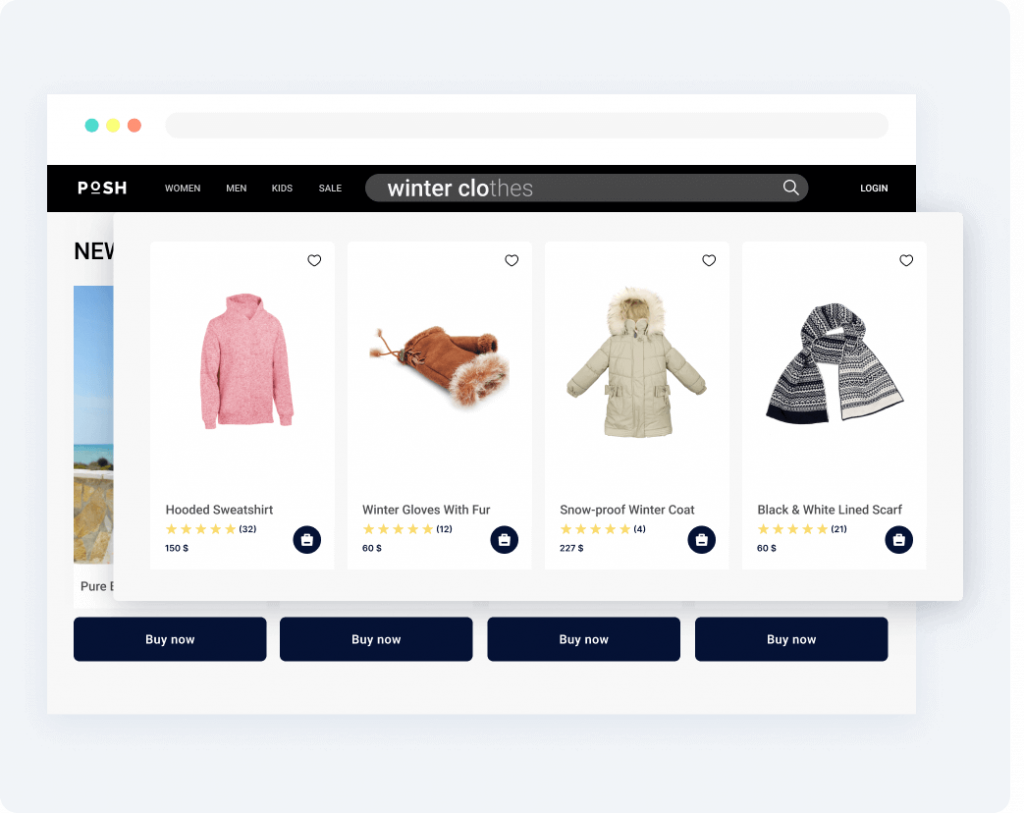
This added context makes it easier for shoppers to make informed decisions.
Bonus: this feature is paired with intelligent query auto-completion, which automatically suggests relevant search terms as shoppers type.
Accurate results, even with mistakes
Typos are a common part of online shopping, especially when customers are typing quickly on mobile devices.
A small error, like typing “prfume” instead of “perfume,” shouldn’t get in the way of finding the right product.
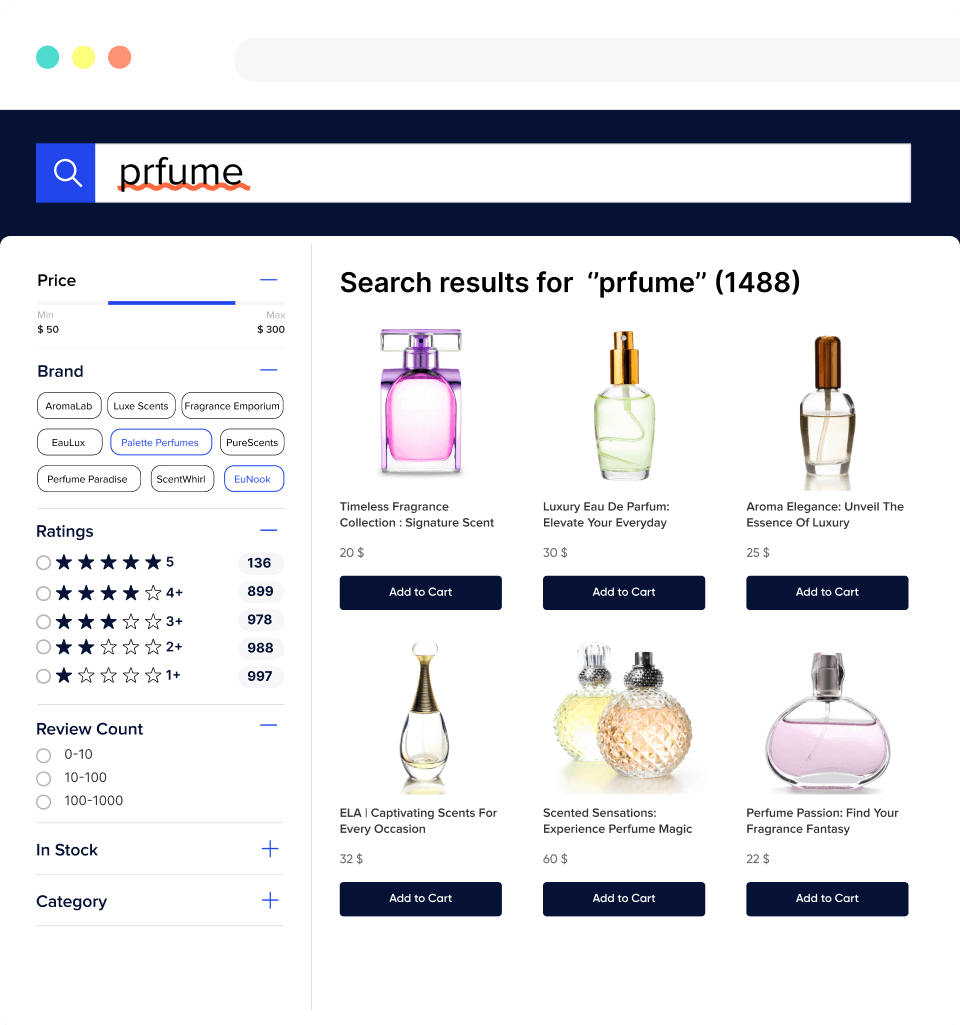
Eureka addresses this with its typo tolerance feature, which automatically detects and corrects common spelling mistakes. Despite these errors, customers are shown accurate and relevant results.
This reduces abandoned searches caused by typos.
Advanced faceting filters
Eureka’s advanced faceting filters make it easy for customers to refine their searches using specific attributes like price, category, color, brand, size, and ratings.
For example, if a customer is searching for red sneakers, they can use the color filter to display options in that specific color instantly.
If they’re also on a budget, they can quickly set a price range to narrow down the options further.
Shoppers can even refine their search using different attributes like preferred brand, material, style, or size.
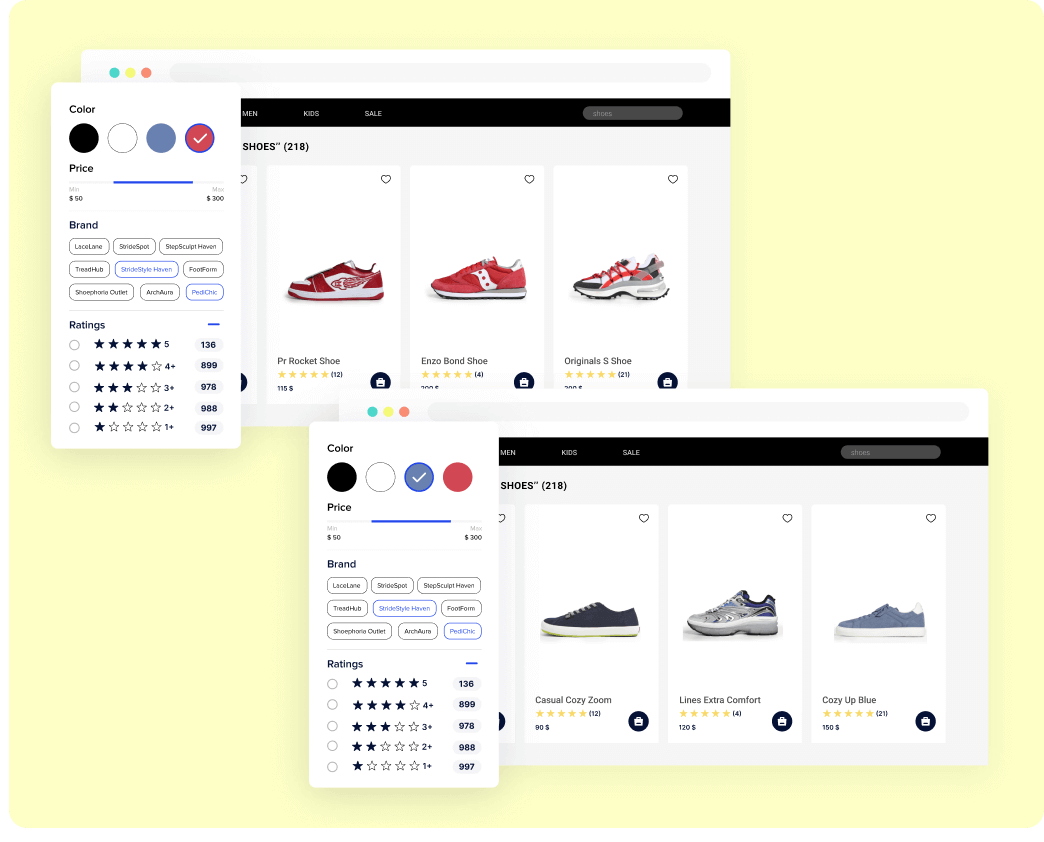
This level of control helps shoppers find exactly what they’re looking for without wasting time.
Ecommerce brands also have the option of configuring a variety of faceting filters based on product attributes like material, style, occasion, price, discount percentage, etc.
Sorting
Eureka makes it simple for shoppers to organize search results in a way that works best for them.
They can sort products by options like price (high to low or low to high), customer ratings, discount percentage, or popularity.
For example, someone hunting for the best deals can sort by “most discounted,” while another shopper focused on quality might prioritize “most rated” items.
This flexibility helps customers find what they need faster and with less effort.
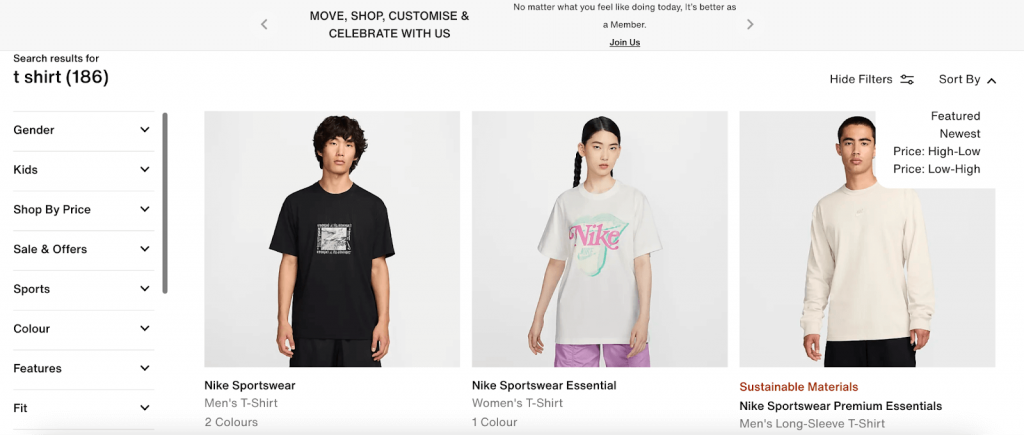
Synonym recognition
Shoppers often use different words to describe the same product—what one person calls “trainers,” another might refer to as “sneakers.”
Eureka’s synonym recognition bridges these gaps by understanding and expanding keyword meanings. No matter what terminology customers use, they can find the most relevant products they’re looking for.
For example, whether a shopper searches for “running shoes,” “lightweight trainers,” or “athletic sneakers,” Eureka delivers consistent and relevant results.
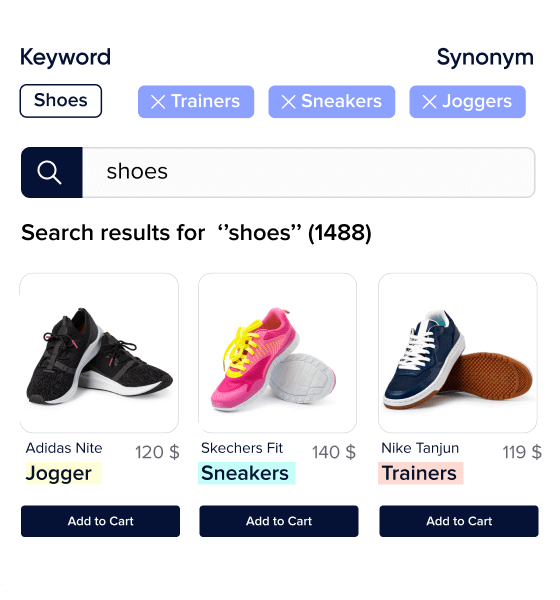
Proactive recommendations
Eureka’s proactive recommendations help customers discover products that match their interests by analyzing their browsing history, preferences, and market trends. It doesn’t wait for shoppers to search—it anticipates their needs and suggests items they’re likely to love.
For example, if a shopper often looks at eco-friendly products like reusable bottles or biodegradable packaging, Eureka might recommend similar items, such as bamboo utensils or eco-friendly lunch boxes.
In the same way, someone browsing fitness gear like yoga mats or resistance bands might see suggestions for workout apparel, foam rollers, or water bottles.
This approach feels intuitive and personalized. And helps shoppers find items they might not have thought to search for while creating a more engaging and enjoyable shopping experience.
Understanding true search intent
Eureka’s ability to interpret search intent helps shoppers get results that truly match their needs, even for detailed or specific queries.
Eureka goes beyond basic keywords to understand the context and deliver precise recommendations.
For instance, if a customer searches for “lightweight jackets for hiking,” Eureka identifies the key requirements—lightweight and suitable for hiking—and shows options that meet those criteria.
Similarly, a query like “vegan leather wallets under $50” will return results that consider both the material and the price range.
This level of understanding enhances the search experience, helping customers find exactly what they need without frustration and making their shopping journey more efficient and enjoyable.
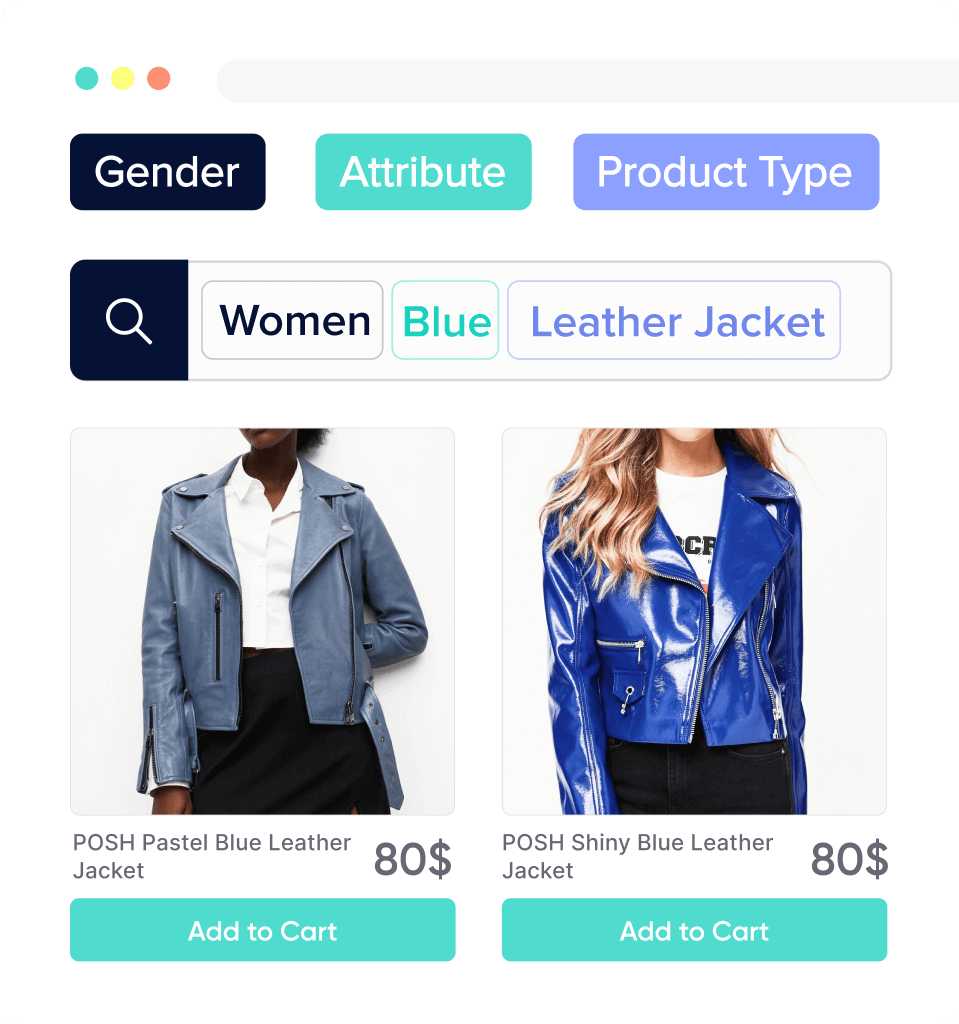
Cross-channel consistency
No matter the device, Eureka delivers a seamless search experience–whether they’re shopping on a desktop, mobile browser, or app. Wherever they start or continue their journey, Eureka makes finding products simple and reliable.
Eureka is designed to integrate effortlessly into any setup.
For quick implementation, businesses can use the no-code visual editor with pre-built templates. For those looking for a more tailored solution, API integration allows for full customization using tools like HTML, CSS, and JavaScript.
This flexibility helps businesses offer a consistent and cohesive shopping experience across all channels.
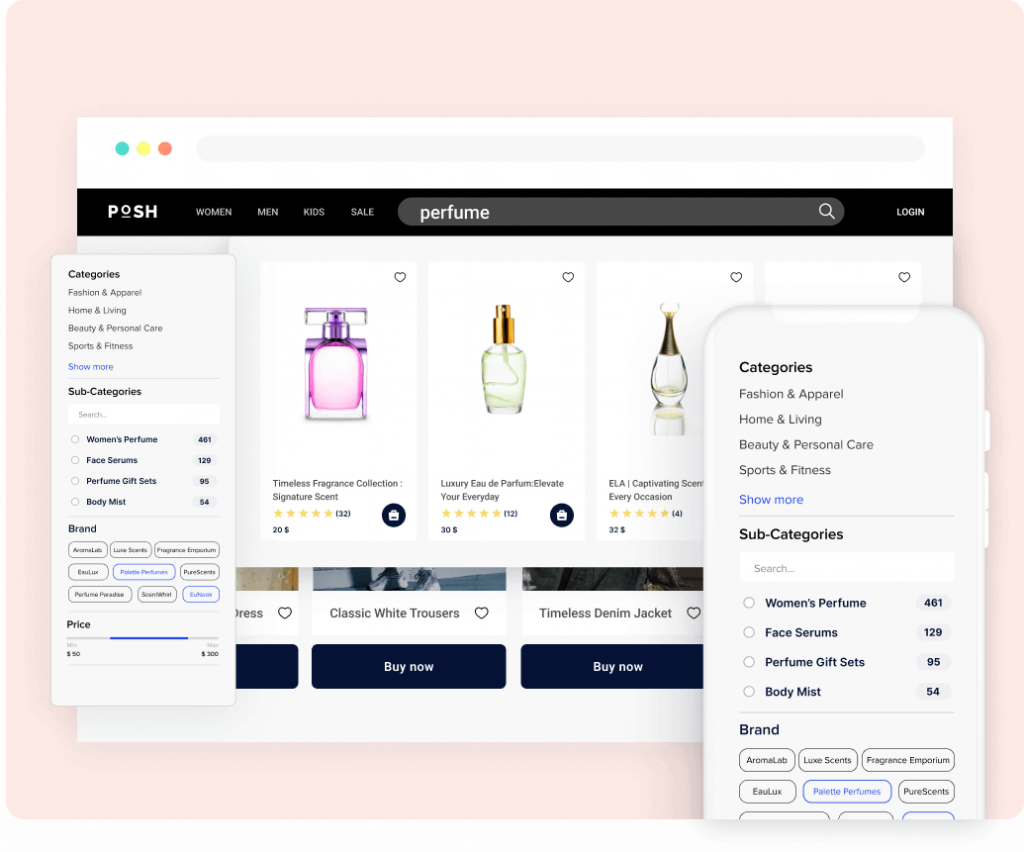
Customizable search results
Eureka gives businesses complete control over search results with its rule-based merchandising tools. This allows them to adjust what customers see based on specific keywords or strategies.
Whether you want to promote seasonal items, highlight discounted products, or manage inventory more effectively, Eureka makes it simple to tailor search results to your goals.
Retailers can customize search results in two ways:
- Product-based customization: Rearrange search results by manually boosting, burying, pinning, or hiding specific products. For instance, you can showcase overstocked items or promote bestsellers during a special campaign with a simple drag-and-drop interface.
- Attribute-based customization: Prioritize products based on attributes like brand, category, color, size, or ratings. For example, during a sale, you can boost items from a specific brand (e.g., Nike) with a discount of over 25%, ensuring they appear at the top of search results.
By customizing search results, Eureka helps retailers deliver a better shopping experience.
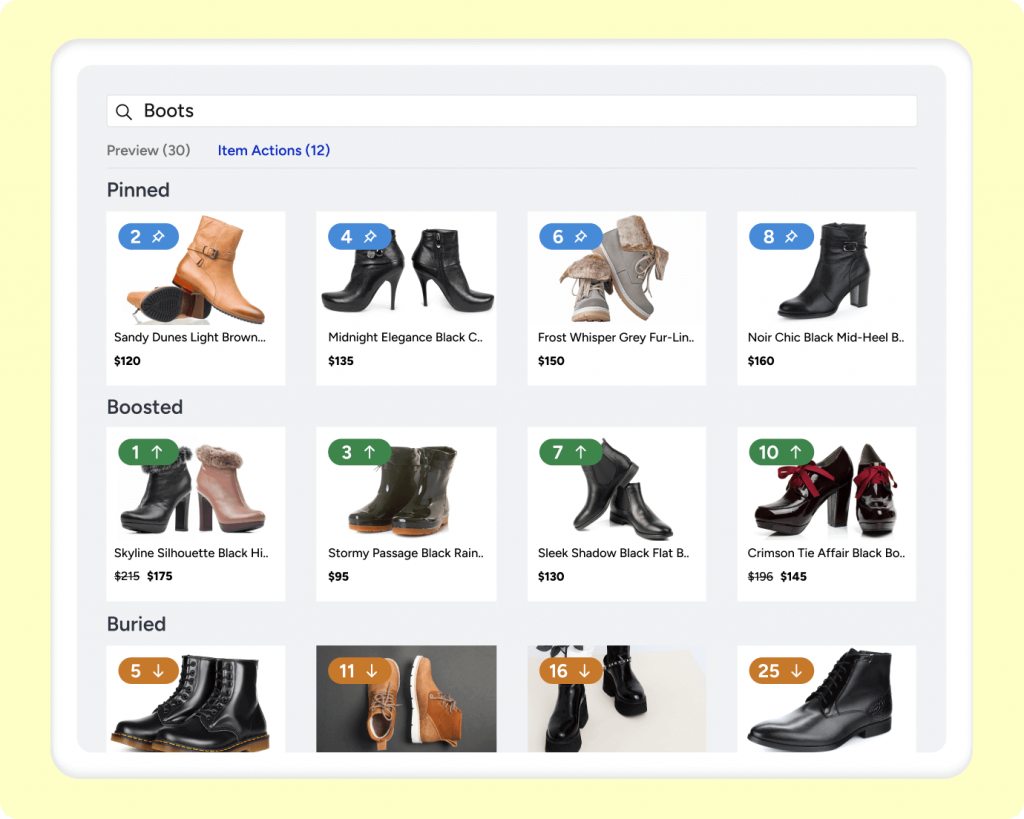
Use Insider to Implement Personalized Search
With the right personalization strategy, your business can achieve measurable results. These results are based on our findings:
- A 30% decrease in bounce rates
- 3X higher conversions
- A 2.6X increase in average order value (AOV)
- A 68% increase in search-based satisfaction
Insider has been named the #1 leader in ecommerce search on G2, achieving the highest score of 97/100 for capabilities like product catalog information, indexing, personalization, recommendations, ranking and relevance, merchandising, and more.
Book a demo today.



















